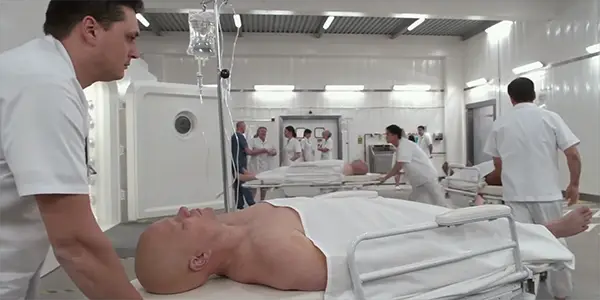DOWNSIZING: Grand Potential Is Lost Through Miniaturized Scope

David is a film aficionado from Colchester, Connecticut. He enjoys…
It is an unfortunate trend in high-concept science fiction films that they tend not to fully deliver on their premises. Nowhere is that more prevalent than in Alexander Payne‘s Downsizing. His most ambitious project yet, the film focuses on a potential future which would result if people were suddenly able to shrink themselves to five inches in length.
Yet, despite some wondrously imaginative special effects and production design, the film never truly delivers on the existential and thought-provoking potential that such a premise would suggest. It is an unfortunate outlier amongst Payne‘s otherwise impeccable filmography.
Cutting it Down
Downsizing presents the idea: what if humans were able to shrink themselves down, and once small could live fully functional lives alongside others in isolated tiny communities? In turn, these people would be helping to reduce waste, saving the world from the effects of overpopulation and climate change. In addition, a person’s current wealth would be worth a lot more when small, so even those of lower incomes would be able to have luxurious lives.
Paul (Matt Damon) and Audrey Safranek (Kristen Wiig) are a couple currently down on their luck, with Paul, though qualified as a doctor, working as an occupational therapist at Omaha Steaks in order to get by. After seeing one of Paul’s old friends from high school, Dave (Jason Sudeikis), and discovering that he has gone small, they decide to look into it, eventually deciding to undergo the procedure and settle into a community called Leisureland. Right before undergoing the procedure, though, Audrey spontaneously decides to back out, leaving Paul alone to deal with the sudden new life of being five inches tall.

Downsizing is a film with a clearly fantastical premise, and in the first half hour or so it suitably builds upon this. Not only does it adequately develop the idea of Paul and Audrey deciding to resort to downsizing, a decision that clearly must be hard for even someone down on their luck, but Payne also recognizes that the idea of people suddenly becoming five inches tall is one ripe for visual gags.
Here, he delivers, from the first glimpse of two salesman (played wonderfully by Neil Patrick Harris and Laura Dern) attempting to sell the idea of being small while seemingly located within a luxurious dollhouse, to the silly back-and-forth exchange that occurs when Paul talks to his tiny friend while perched on top of a box of crackers. The people, while small, also appear seamlessly integrated within their larger environment, an admirable feat by any means considering the inherent difficulty in establishing this wide range in perspective.
The actual downsizing procedure itself is also a highlight of the film – the process somewhat resembles a factory-assembly line, with full-grown, hairless adults being worked on by rows of doctors and then being “cooked” into their smaller versions, eventually resembling tiny, naked rats that have to be moved with spatulas. Rolfe Kent‘s score is at its forefront here, bouncing in time with the procedures themselves, in some ways reminding me of a Danny Elfman score from one of his many Tim Burton collaborations.
Small World, Big Problems
Where Downsizing diverts from its one fanciful concept is where it started to lose me. Once Paul settles into Leisureland, he is alone, and due to a divorce he is forced to once again work an aimless job, this time answering phones as a telemarketer. The film seems to pick up steam once he meets his upstairs party-hard neighbor Dusan (Christoph Waltz), and what follows is an elaborate drug-fueled rager, perhaps a sign of things to come. Yet, after this, Paul meets Ngoc Lan Tran (the bright Hong Chau), a Vietnamese woman who was smuggled to Leisureland after being shrunk against her will, and who spends her days helping the less fortunate, eventually roping Paul along on her daily ventures.

Chau brings vibrancy to a character who easily could have been one-note, yet even the addition of her to the cast doesn’t much help the story. What Payne seems to be going for in these story-lines, which I wasn’t immediately against, is the idea that, even if you change your surroundings, you’ll find that your problems will often follow you there. In Paul’s case, after being shrunk, he’s back to being almost exactly where he was before, albeit now five inches tall.
Yet, what this theme also does is detract from the science fiction concept in the first place. The idea of being shrunk and even the wider glimpse of the outside world is now rarely seen after Paul gets himself downsized, and though Leisureland is an extravagantly realized, lived-in world, the story itself soon starts to resemble something more akin to a romantic drama.
Humanistic Love Story
Hong Chau and Matt Damon do share a ripe chemistry, and the eventual result of their connection is somewhat palpable, but then why does this story even have to take place in a miniaturized world as opposed to the regular one? Gone are the visual gags, or the larger understanding of what it is to be five inches tall in a world of giants. Even when they have separated from their safe, isolated community at one point, the dangers of the outside world seem almost entirely absent. This is no The Incredible Shrinking Man or even Honey, I Shrunk the Kids, films which took this concept to a much more realized degree.

Payne is renowned for his humanistic stories, such as in Sideways or Nebraska especially. His films resonate with people of widely ranging ages, with his focus on flawed protagonists just looking to make and understand their place in the world. Here, this character is played by Matt Damon, who gives the film some spirit despite not having any truly heavy material to work with.
In some ways, Downsizing even somewhat succeeds with its overarching theme, showing Paul’s eventual recognition of how he can make a difference in life even by making small changes in the less-fortunate communities around him. But where the film once again falls short is one of the very reasons that it has a science fiction premise in the first place.
Humanity’s Future
Above all, Downsizing is Payne‘s warning of the devastating effects of overpopulation and climate change. The process of downsizing itself, though science fiction, is seemingly a viable option to solve this (despite the obvious difficulties of transportation, which are never fully explained in the film).
Yet, once Paul is shrunk, the film doesn’t really delve further into the concept of climate change other than to bring it up at later inconsequential points; for example, when Paul meets Dr. Jørgen Asbjørnsen (Rolf Lassgård), inventor of the downsizing procedure, he hears from him that Arctic methane emissions are now at an incurable high. But the only effect this has on the film itself is to set up its final conflict in a shoehorned way.
Downsizing: Conclusion
What Downsizing really lacks, more than anything else, is an idea of what type of movie it wants to be. It attempts, at various points, to be a wacky science fiction, a humanistic love story with a sci-fi premise, satirical social commentary, and even dabs of race and white privilege discussions. But in the end, it’s too loosely spread out to fully succeed at any of these. It’s, unfortunately, what happens when a story gets too big for its own good.
What are your thoughts on Downsizing? Are you a fan of Alexander Payne’s films?
Downsizing was released on December 22 in the US and will be released on January 24, 2018 in the UK. For all international release dates, click here.
Does content like this matter to you?
Become a Member and support film journalism. Unlock access to all of Film Inquiry`s great articles. Join a community of like-minded readers who are passionate about cinema - get access to our private members Network, give back to independent filmmakers, and more.
David is a film aficionado from Colchester, Connecticut. He enjoys writing, reading, analyzing, and of course, watching movies. His favorite genres are westerns, crime dramas, horror, and sci-fis. He also enjoys binge-watching TV shows on Netflix.













